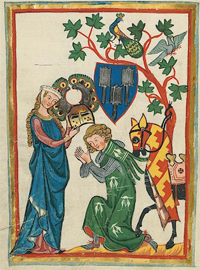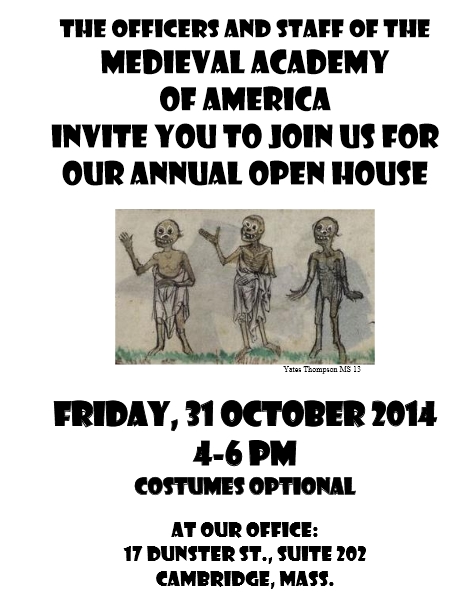
Cod. Pal. germ. 848, Große Heidelberger Liederhandschrift (Codex Manesse), Zürich, c.1300-c.1340, fol. 82v.
We are pleased to announce the names of the MAA members who have generously agreed to stand for election to office in 2015:
President: Barbara Newman (English, Religious Studies, & Classics, Northwestern Univ.)
1st Vice-President: Carmela Vircillo Franklin (Classics, Columbia Univ.)
2nd Vice-President: Margot E. Fassler (Music History and Liturgy, Univ. of Notre Dame)
Council (four seats available):
Robert Bjork (English, Arizona State Univ.)
Gail Gibson (English, Davidson College)
F. Eliza Glaze (History, Coastal Carolina Univ.)
Aden Kumler (Art History, Univ. of Chicago)
Sara S. Poor (German, Princeton Univ.)
Zrinka Stahuljak (French/Comp. Lit., Univ. of California, Los Angeles)
John Tolan (History, Univ. of Nantes)
Gernot Wieland (English/Med. Latin, Univ. of British Columbia)
Nominating Committee (two seats available):
Matilda Bruckner (French, Boston College)
Andrew Cole (English, Princeton Univ.)
Adam Kosto (History, Columbia Univ.)
Brett Whalen (History, Univ. of North Carolina at Chapel Hill)
The list of candidates with their photos and brief biographies appears online here.
There are eight candidates for four openings on the Council, the governing body of the Academy. There are four candidates for two openings on the Nominating Committee, tasked with proposing candidates for the annual election. As is our practice, the slate of presidential officers is presented unopposed, although nominations by petition may be made as follows, in accordance with article 26 of the By-Laws:
Nominations of other members of the Academy for elected officers, Councillors, or members of the Nominating Committee may be made by written petition signed by at least seven members of the Academy. A nomination by petition may be for a single office, several offices, or an entire slate. Such petitions must be received by the Executive Director within twenty days of the circulation of the report of the Nominating Committee (article 25), unless the Council extends the period for making nominations by petition.
As the slate of candidates was announced by email on 22 October, the closing date for nomination by petition has been set at midnight, 12 November 2014. Additional information about the governance of the Academy can be found here.
Electronic balloting will open in December. If you would like to receive a paper ballot, please contact the Executive Director.
Voting in the Medieval Academy elections is one of the most important means that members have to impact both the Academy and the future of medieval studies in North America. We look forward to your participation in the election of the leadership of the Medieval Academy.








